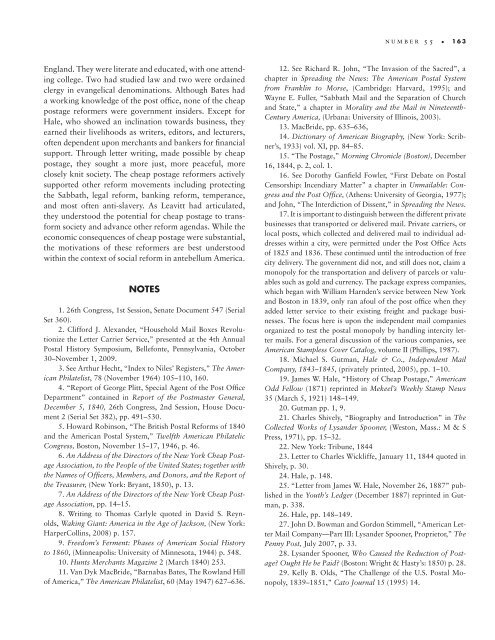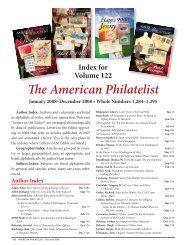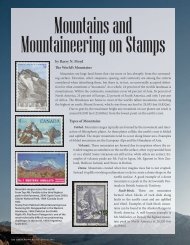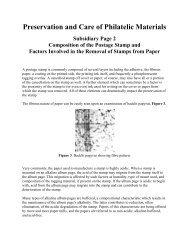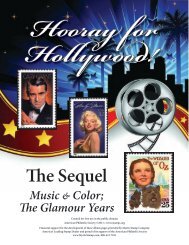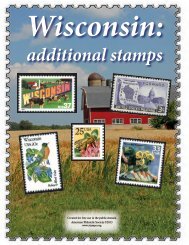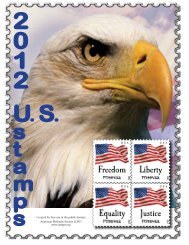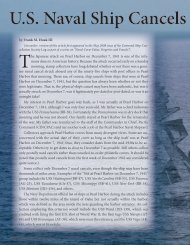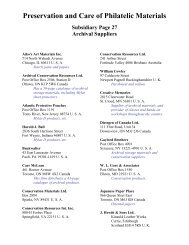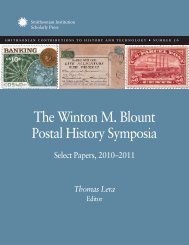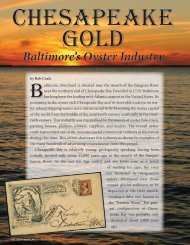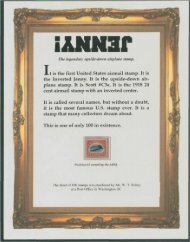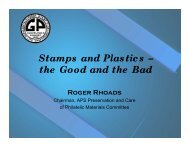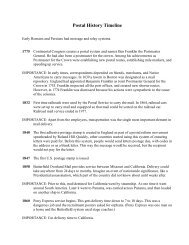The Winton M. Blount Postal History Symposia - Smithsonian ...
The Winton M. Blount Postal History Symposia - Smithsonian ...
The Winton M. Blount Postal History Symposia - Smithsonian ...
- No tags were found...
Create successful ePaper yourself
Turn your PDF publications into a flip-book with our unique Google optimized e-Paper software.
n u m b e r 5 5 • 1 6 3England. <strong>The</strong>y were literate and educated, with one attendingcollege. Two had studied law and two were ordainedclergy in evangelical denominations. Although Bates hada working knowledge of the post office, none of the cheappostage reformers were government insiders. Except forHale, who showed an inclination towards business, theyearned their livelihoods as writers, editors, and lecturers,often dependent upon merchants and bankers for financialsupport. Through letter writing, made possible by cheappostage, they sought a more just, more peaceful, moreclosely knit society. <strong>The</strong> cheap postage reformers activelysupported other reform movements including protectingthe Sabbath, legal reform, banking reform, temperance,and most often anti- slavery. As Leavitt had articulated,they understood the potential for cheap postage to transformsociety and advance other reform agendas. While theeconomic consequences of cheap postage were substantial,the motivations of these reformers are best understoodwithin the context of social reform in antebellum America.NOTES1. 26th Congress, 1st Session, Senate Document 547 (SerialSet 360).2. Clifford J. Alexander, “Household Mail Boxes Revolutionizethe Letter Carrier Service,” presented at the 4th Annual<strong>Postal</strong> <strong>History</strong> Symposium, Bellefonte, Pennsylvania, October30–November 1, 2009.3. See Arthur Hecht, “Index to Niles’ Registers,” <strong>The</strong> AmericanPhilatelist, 78 (November 1964) 105–110, 160.4. “Report of George Plitt, Special Agent of the Post OfficeDepartment” contained in Report of the Postmaster General,December 5, 1840, 26th Congress, 2nd Session, House Document2 (Serial Set 382), pp. 491–530.5. Howard Robinson, “<strong>The</strong> British <strong>Postal</strong> Reforms of 1840and the American <strong>Postal</strong> System,” Twelfth American PhilatelicCongress, Boston, November 15–17, 1946, p. 46.6. An Address of the Directors of the New York Cheap PostageAssociation, to the People of the United States; together withthe Names of Officers, Members, and Donors, and the Report ofthe Treasurer, (New York: Bryant, 1850), p. 13.7. An Address of the Directors of the New York Cheap PostageAssociation, pp. 14–15.8. Writing to Thomas Carlyle quoted in David S. Reynolds,Waking Giant: America in the Age of Jackson, (New York:HarperCollins, 2008) p. 157.9. Freedom’s Ferment: Phases of American Social <strong>History</strong>to 1860, (Minneapolis: University of Minnesota, 1944) p. 548.10. Hunts Merchants Magazine 2 (March 1840) 253.11. Van Dyk MacBride, “Barnabas Bates, <strong>The</strong> Rowland Hillof America,” <strong>The</strong> American Philatelist, 60 (May 1947) 627–636.12. See Richard R. John, “<strong>The</strong> Invasion of the Sacred”, achapter in Spreading the News: <strong>The</strong> American <strong>Postal</strong> Systemfrom Franklin to Morse, (Cambridge: Harvard, 1995); andWayne E. Fuller, “Sabbath Mail and the Separation of Churchand State,” a chapter in Morality and the Mail in Nineteenth-Century America, (Urbana: University of Illinois, 2003).13. MacBride, pp. 635–636,14. Dictionary of American Biography, (New York: Scribner’s,1933) vol. XI, pp. 84–85.15. “<strong>The</strong> Postage,” Morning Chronicle (Boston), December16, 1844, p. 2, col. 1.16. See Dorothy Ganfield Fowler, “First Debate on <strong>Postal</strong>Censorship: Incendiary Matter” a chapter in Unmailable: Congressand the Post Office, (Athens: University of Georgia, 1977);and John, “<strong>The</strong> Interdiction of Dissent,” in Spreading the News.17. It is important to distinguish between the different privatebusinesses that transported or delivered mail. Private carriers, orlocal posts, which collected and delivered mail to individual addresseswithin a city, were permitted under the Post Office Actsof 1825 and 1836. <strong>The</strong>se continued until the introduction of freecity delivery. <strong>The</strong> government did not, and still does not, claim amonopoly for the transportation and delivery of parcels or valuablessuch as gold and currency. <strong>The</strong> package express companies,which began with William Harnden’s service between New Yorkand Boston in 1839, only ran afoul of the post office when theyadded letter service to their existing freight and package businesses.<strong>The</strong> focus here is upon the independent mail companiesorganized to test the postal monopoly by handling intercity lettermails. For a general discussion of the various companies, seeAmerican Stampless Cover Catalog, volume II (Phillips, 1987).18. Michael S. Gutman, Hale & Co., Independent MailCompany, 1843–1845, (privately printed, 2005), pp. 1–10.19. James W. Hale, “<strong>History</strong> of Cheap Postage,” AmericanOdd Fellow (1871) reprinted in Mekeel’s Weekly Stamp News35 (March 5, 1921) 148–149.20. Gutman pp. 1, 9.21. Charles Shively, “Biography and Introduction” in <strong>The</strong>Collected Works of Lysander Spooner, (Weston, Mass.: M & SPress, 1971), pp. 15–32.22. New York: Tribune, 184423. Letter to Charles Wickliffe, January 11, 1844 quoted inShively, p. 30.24. Hale, p. 148.25. “Letter from James W. Hale, November 26, 1887” publishedin the Youth’s Ledger (December 1887) reprinted in Gutman,p. 338.26. Hale, pp. 148–149.27. John D. Bowman and Gordon Stimmell, “American LetterMail Company—Part III: Lysander Spooner, Proprietor,” <strong>The</strong>Penny Post, July 2007, p. 33.28. Lysander Spooner, Who Caused the Reduction of Postage?Ought He be Paid? (Boston: Wright & Hasty’s: 1850) p. 28.29. Kelly B. Olds, “<strong>The</strong> Challenge of the U.S. <strong>Postal</strong> Monopoly,1839–1851,” Cato Journal 15 (1995) 14.


